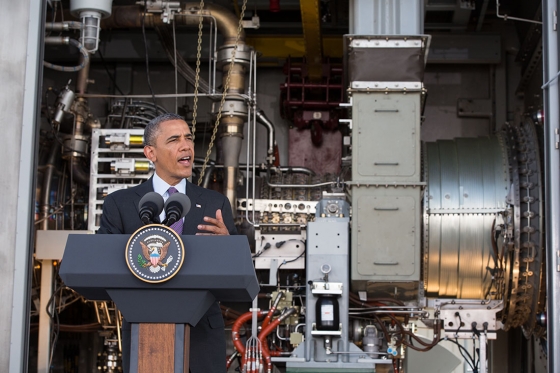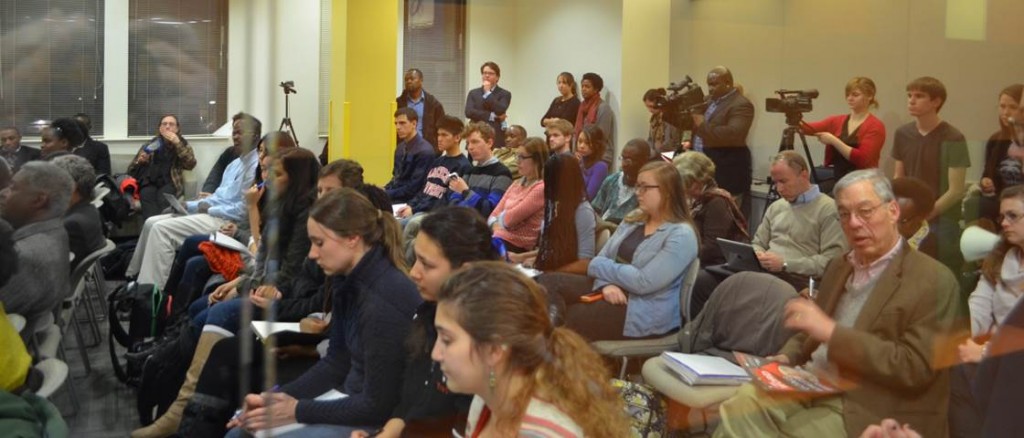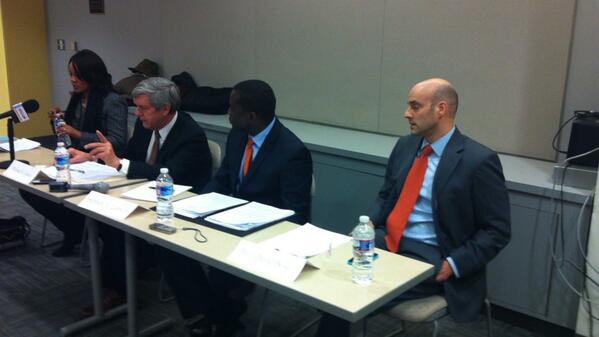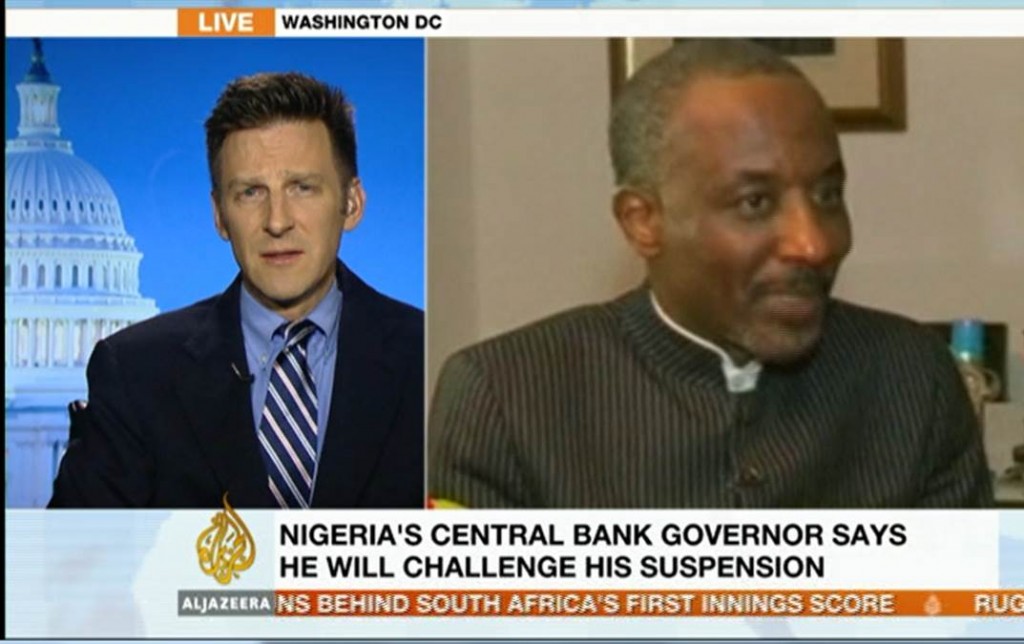A cornerstone of President Obama’s policy towards Africa is a new initiative to expand access to electricity, dubbed “Power Africa”. A great deal of economic research (and common sense) suggests that unreliable power is a major barrier to economic growth and long term development. However a letter signed by 75 African groups across 18 African countries has raised concerns about Power Africa, as well as the Electrify Africa Act and the Overseas Private Investment Corporation. Ever since the 1990s,

Obama speaking at a power plant in Tanzania, July 2013 (White House photo)
OPIC has been targeted by budget hawks as “corporate welfare” since it helps underwrite financial risks associated with private investment in the developing world.
The signatories to the letter wrote, “We do not need to poison communities in Africa in order to develop sustainably. Consequently, we reject any further extraction of and exploitation of fossil fuels, including natural gas, oil, coal and unconventional fossil fuels” as part of the Power Africa initiative. This letter is particularly relevant to attempts by some to weaken OPIC’s carbon cap. Indeed the groups wrote, “OPIC’s cap on greenhouse gas emissions must not be tampered with, most certainly not in the false name of supplying power to Africa’s poor.” Instead, the African NGOs urged support for “small-scale, decentralized, community-owned renewable energy initiatives throughout the African countryside and cities.”
The letter is again getting wide circulation in Washington as Power Africa and the enabling legislation winds its way through Congress, including today’s markup by the House Committee on Foreign Affairs.
10 November 2013
Subject: Leave the oil in the soil; leave the coal in the hole
Dear President Obama,
We are African organizations working for the realization of a healthy and just environment for the people of our countries. We believe that every person has the right to a dignified life of quality on a livable planet. The climate crisis — brought on by developed countries — poses a monumental threat to this basic human right.
It is with this in mind that we write to you concerning the Power Africa initiative, as well as congressional legislation apparently meant to operationalize your initiative, including the Electrify Africa Act of 2013. Like you, we feel a great sense of urgency to address the pervasive energy poverty found in most African countries. It is shameful that in 2013, more than two-thirds of sub-Saharan Africa’s population lacks electricity, with that number growing to more than 85 per cent in rural areas.
We are therefore working hard to bring decentralized, truly clean, community-controlled renewable energy to all of our people. We do not need to poison communities in Africa in order to develop sustainably. Consequently, we reject any further extraction and exploitation of fossil fuels, including natural gas, oil, coal, and unconventional fossil fuels.
These dirty fuel projects cause devastating impacts on local health, communities, and the environment. We similarly reject large hydropower projects, and other ‘false solutions’ such as carbon trading and offsetting. Smaller scale solar, wind, and geothermal, and mini-hydro, can provide us with sustainable lives and livelihoods without sinking our health along with that of the continent and the planet.
When we read statements from the White House about “new discoveries of vast reserves of oil and gas”, and that “The recent discoveries of oil and gas in sub-Saharan Africa will play a critical role in defining the region’s prospects for economic growth and stability, as well as contributing to broader near-term global energy security”1 – our response is to say,
- “Leave the oil in the soil; leave the coal in the hole.”
- It is simply impossible to continue to exploit fossil fuels if we want to avoid climate catastrophe. And we want to avoid climate catastrophe. So do you.
- Climate change is already having a heightened impact in Africa, with increasing temperatures, more floods and droughts, and failing agriculture, which is increasing conflict and threatening the lives and livelihoods of many millions.
Furthermore, we know from many decades of direct experience that the World Bank-driven development model pushing large-scale infrastructure and power projects rarely, if ever, alleviates poverty. Instead, such projects exacerbate inequality and conflict, devastate the environment, and frequently involve human rights violations (i.e. the well-documented “resource curse”). These projects do not help us at home but rather are for export and to line the pockets of multinational corporations and local elites.
But even more troubling is how African poverty has historically been used to line the pockets of U.S. corporations and “experts”. Much of the money given as “aid” to African and other countries actually returns right back to the “experts” and consultants of donor countries 2. It thus troubles us tremendously that Power Africa has been advertised to U.S. audiences as an initiative to benefit U.S. corporations. For example, upon Power Africa’s launch, Forbes 3 wrote that it “greases billions in deals for General Electric”, saying the firm is “perhaps the biggest beneficiary” of the initiative, noting the U.S. Export-Import Bank’s4 central role in financing its ambitions in the region. Indeed, the chair of the Export-Import Bank was quite frank about this over Twitter, referring to Power Africa as a “$7B plan to power up @General Electric”, and he posted a picture of President Obama’s speech on the initiative in Tanzania with a GE logo more than twice the size of the presidential seal.
We therefore urge you to re-think any support for large scale power and infrastructure projects in the name of increasing energy access for Africa. We know that this hasn’t worked in the past, and it won’t work now. What will work are small-scale, decentralized, community-owned renewable energy initiatives throughout the African countryside and cities.
Even the International Energy Agency has said as much. Its 2010 World Energy Outlook found that for universal energy access to occur by 2030, 70 per cent of rural populations will need to be served by decentralized renewable energy, and that electrification strategies should focus heavily on decentralized renewable energy systems, such as small-scale, democratically controlled wind, solar and microhydro co-operatives which meet local needs and end peoples’ reliance on the corporate-controlled energy system. Advances in distributed renewable energy in recent years have made this technology more cost effective than outmoded grid extension from centralized fossil fuel projects; much like cheaper mobile phone technology has made extension of phone lines obsolete. When the externalized cost of fossil fuel projects is factored in — including the cost of harmful health impacts, loss of land, environmental and agricultural damage, and conflicts – distributed renewable energy solutions become even more cost effective than fossil fuel projects.
Unfortunately, to our dismay, we have learned that fossil fuel companies, the ONE Campaign, and even some in the Obama administration are using Power Africa and the Electrify Africa Act to try to weaken crucial gains in U.S. development financing at the Overseas Private Investment Corporation (OPIC). OPIC’s landmark climate and development policy, which is already having a positive effect in directing the agency’s portfolio toward renewable energy, requires the agency to reduce its fossil fuel financing and increase its renewable energy financing, bringing cleaner energy access to the poor.
OPIC’s cap on greenhouse gas emissions must not be tampered with, most certainly not in the false name of supplying power to Africa’s poor.
Weakening this policy will mean more polluting energy for Africa. What’s more, it may result in increased numbers of large centralized fossil fuel power projects that serve industrial customers but do not increase energy access for the poor, particularly in rural areas.
We thank you for your attention to these most important matters as we all move boldly toward sustainable livelihoods in the face of the climate crisis.
1 The White House Fact Sheet: Power Africa, 30 June, 2013,
http://www.whitehouse.gov/the-press-office/2013/06/30/fact-sheet-power-africa.
2 Timothy Mitchell. Rule of Experts: Egypt, Techno-Politics, Modernity,
University of California press, 2002
3 See http://www.forbes.com/sites/christopherhelman/2013/07/01/with-power-africa-plan-obama-to-grease-billions-in-deals-for-g-e/.
4 We note that the U.S. Export-Import Bank has gained notoriety for its skyrocketing financing of fossil fuels, including the 4800 MW Kusile power project in South Africa, which is exacerbating energy poverty and causing tremendous local and climate pollution. Indeed, we vociferously protested the Export-Import Bank’s financing of Kusile.
Sincerely,
Abibiman Foundation, Ghana
ADEID, Cameroun
African Alliance for Rangeland Management and Development, Kenya
African Biodiversity Network, Kenya
African Biosafety Centre, South Africa
African Research Association managing Development in Nigeria
AME, Cameroun
Association Nigérienne des Scouts de l’Environnement, Niger
ATTAC Burkina, Burkina Faso
Caravane D’Animation Culturelle Pour Le Development Durably, DRC
Center for Secured Health and Environmental Development Initiatives, Nigeria
Centre for 21st Century Issues, Nigeria
Centre for Civil Society, South Africa
CIKOD, Ghana
Climate Change Network Nigeria
Committee on Vital Environmental Resources, Nigeria
Daughters of Mumbi Global Resource Center, Kenya
Direction Générle des Forêts et des Ressources Naturelles, Bénin
Earth Peoples, Africa
Earthlife Africa Durban, South Africa
Earthlife Africa Jhb, South Africa
Environmental Rights Action/Friends of the Earth Nigeria
Friends of Lake Turkana, Kenya
Friends of the Earth Africa
Friends of the Earth Ghana
Greater Middelburg Resident’s Association, South Africa
Greenpeace Africa
groundWork, Friends of the Earth, South Africa
Growing Power NPC, South Africa
Health of Mother Earth, Nigeria
Host Community Network Gwagwalada-Abuja, Nigeria
Host Community Network Federal Capital Territory, Nigeria
Host Community Network Chika-Lugbe, Nigeria
Host community Network Karimo, Nigeria
Host Community Network Mape, Nigeria
Institute for Sustainable Development, Ethiopia
Irrigation Training and Economic Empowerment Organization – IRTECO, Tanzania
Jamaa Resource Initiatives, Kenya
Jeunes volontaires pour l’Environnement de la RDC (JVE-RDC), DRC
JFE, Cameeroon
Johannesburg Anglican Environmental Initiative, South Africa
Justiça Ambiental/ Friends of the Earth Mozambique
Kenya Debt Relief Network – KENDREN, Kenya
Labour, Health and Human Rights Development Centre, Nigeria
Les Amis de la Terre-Togo
Maendeleo Endelevu Action Program, Kenya
National Association of Professional Environmentalists, Uganda
Never Ending Food, Malawi
Newcastle Environmental Justice Alliance, South Africa
Next Generation Youth Initiative International (NEGYII), Nigeria
NGO Coalition for Environment (NGOCE), Calabar, Nigeria
Nigerian Conservation Foundation, Nigeria
No REDD in Africa Network
Ogoni Solidarity Forum, Nigeria
Organisation de Bienfaisance et de Dévellopement, Djibouti
Project 90 by 2030, South Africa
Rainforest Resource and Development Centre (RRDC), Nigeria
RAINS, Ghana
SAFCEI, South Africa
South Durban Community Environmental Alliance, South Africa
Southern Cape Land Committee, South Africa
TCOE, South Africa
The Rules, Africa
The Young Environment Network, Nigeria
Unemployed People’s Movement, South Africa
Uniao Nacional de Camponeses (National Farmer Union of Mozambique), Mozambique
University of Kwazulu Natal, South Africa
Wise Administration of Terrestrial Environment and Resources (WATER), Nigeria
Women Environmental Programme Burkina, Burkina Faso
World Neighbours, Africa
Worldview -The Gambia
Young Volunteers for Environment, Ethiopia
Youth Volounteers for the Environment, Zambia
YVE Ghana
350.org Durban, South Africa
 the American Bar Association Center for Human Rights, the student-run Africa Initiative on campus, and a new diaspora organization, East Africa WashingtonProgram. The event drew attention from Africa, Europe, and in the Kenyan media. You can watch a brief clip from the NTV Kenya television coverage here. Participants included:
the American Bar Association Center for Human Rights, the student-run Africa Initiative on campus, and a new diaspora organization, East Africa WashingtonProgram. The event drew attention from Africa, Europe, and in the Kenyan media. You can watch a brief clip from the NTV Kenya television coverage here. Participants included:

